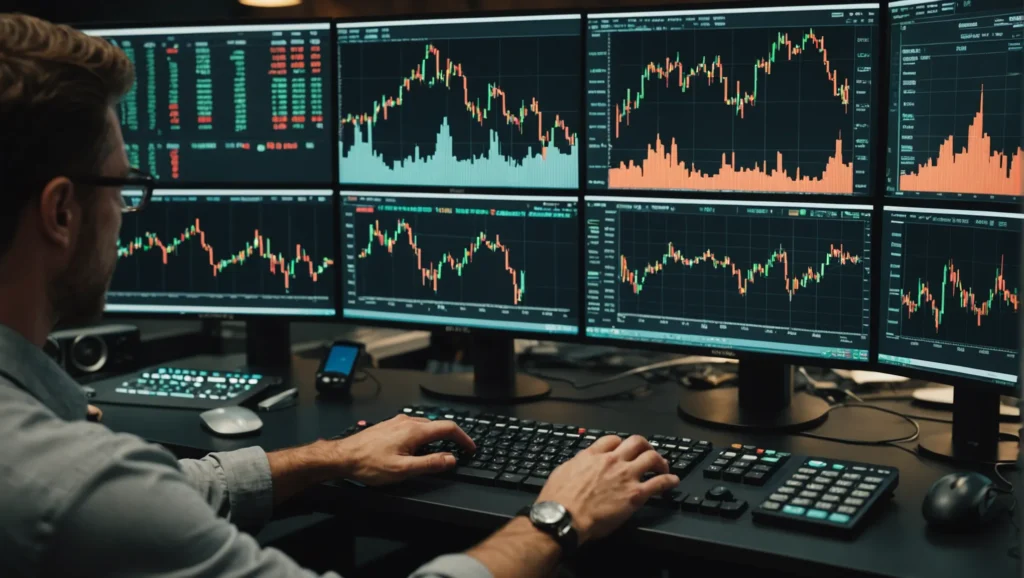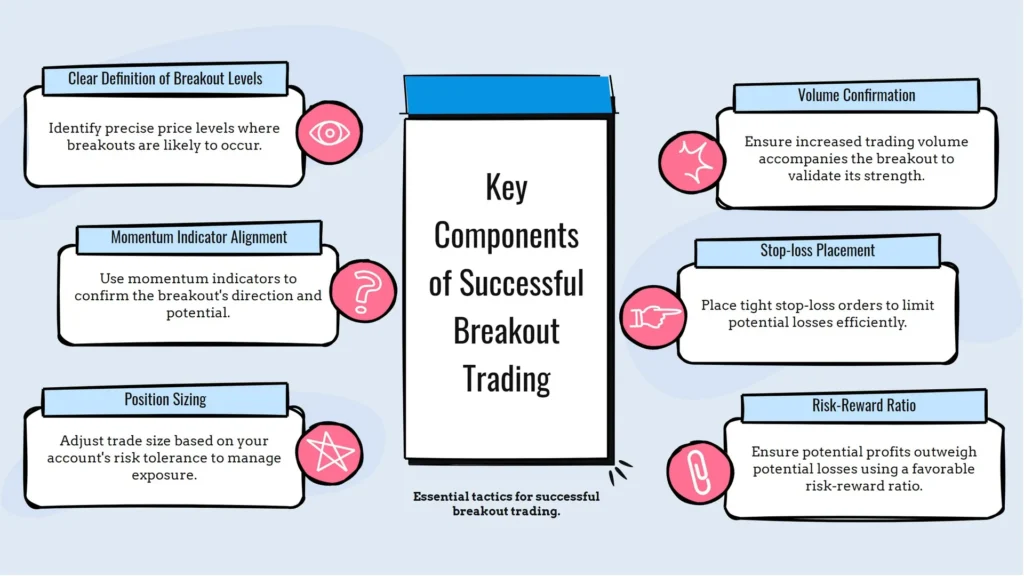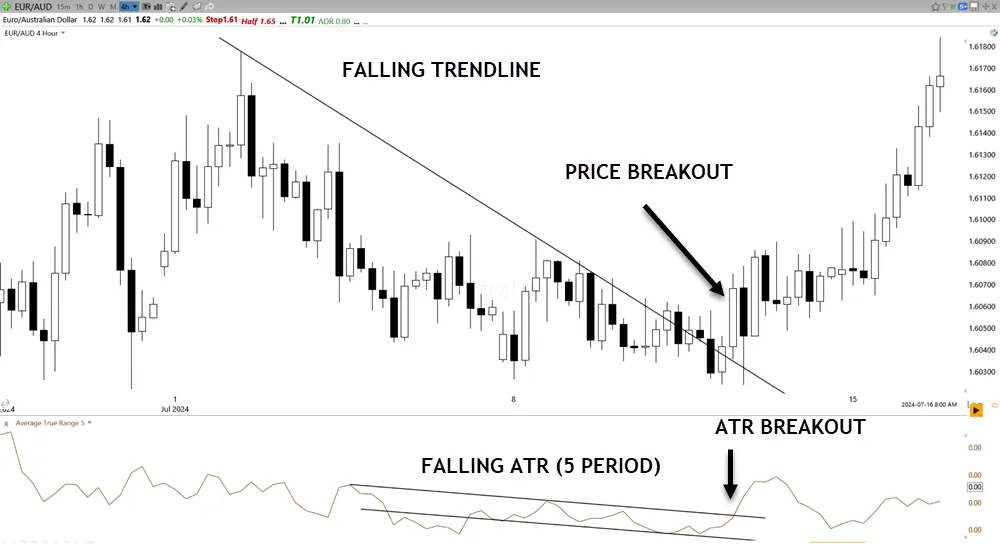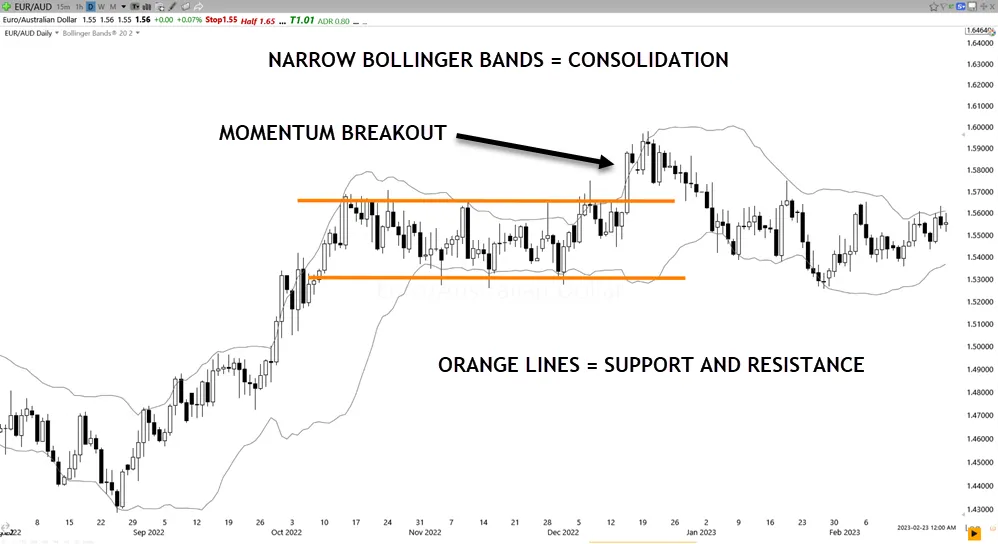If you’re looking to capitalize on significant price movements in the forex market, breakout trading systems can be your ticket to success. These strategies will help you identify and act on moments when currency pairs burst through key levels, potentially leading to substantial profits.

With numerous breakout systems available, you’re probably wondering which ones are truly effective. Forex breakout trading offers a wealth of options, from classic support and resistance strategies to volatility-based approaches. Let’s examine some of the most powerful systems traders rely on to capture market momentum.
Supercharge your Forex trading with our free, exclusive 50 EMA strategy guide and start maximizing your profits today! Grab your copy here.
Understanding Breakout Trading in Forex
Four key elements define breakout trading in Forex: identifying support and resistance levels, recognizing chart patterns, confirming genuine breakouts, and managing risk effectively.
To do well with this strategy, you’ll need to develop a good eye for price action breakouts and use breakout confirmation indicators that add to the probability of success.
Start by improving your ability to spot support and resistance levels on charts. These essential price points often act as barriers, containing currency pair movements. When prices breach these levels, significant moves can occur.
Look for common chart patterns like triangles, bull/bear flags, and head and shoulder formations, which can signal potential breakouts.
Confirmation is critical to avoid false breakouts. Use indicators like increased volume (FX Futures) or strong price moves to validate genuine breakouts. Once confirmed, set your entry points just beyond the breakout level.
Risk management for breakouts is one of the most important things to do. Implement stop-loss orders to protect against sudden reversals, and use tools like the Average True Range (ATR) to set appropriate levels.
Define clear profit targets based on measured moves or other technical analysis methods.
Key Components of Successful Breakout Trading Systems

Building on the fundamentals of breakout trading, let’s look at the key components that make a breakout trading system truly effective.
To develop a strong forex breakout strategy, you’ll need to focus on several critical elements.
Breakout Entry Techniques:
- Clear definition of breakout levels
- Volume confirmation
- Momentum indicator alignment
Risk Management:
- Stop-loss placement: Implement tight stops to limit potential losses
- Position sizing: Adjust trade size based on account risk tolerance
- Risk-reward ratio: Guarantee potential profits outweigh potential losses
False Breakout Filters:
- Time-based filters: Wait for price confirmation before entering
- Multiple time frame analysis: Verify breakout across various chart periods
- Trend alignment: Confirm breakout direction matches the overall market trend
Additional Components:
- Support and resistance identification
- Backtesting and optimization
- Market environment consideration
- Adaptability to changing conditions
- Psychological preparation
Top 5 Breakout Trading Systems for Forex
You’ll find that successful traders often rely on a handful of proven strategies, each with its unique approach to identifying and exploiting breakouts.
Let’s examine five of the most effective breakout trading systems for forex, ranging from classic support and resistance methods to more sophisticated volatility-based approaches.
Classic Support and Resistance Breakout Strategy
At the heart of forex trading lies the Classic Support and Resistance Breakout Strategy, a fundamental approach that many traders rely on. This strategy involves identifying key support and resistance levels on price charts, patiently waiting for breakouts, and entering trades in the direction of the move.

To implement this strategy effectively:
- Draw horizontal lines at significant support and resistance levels
- Watch for clear breaches, often accompanied by increased volume
- Enter long positions when the price breaks above the resistance
- Enter short positions when the price breaks below the support
- Place stop-loss orders just beyond the broken level
- Set profit targets based on range height or other technical factors
Understanding breakout trading psychology is essential for success. High-probability breakouts often occur after periods of consolidation, when price builds tension before a decisive move. Developing a strong breakout trading plan helps manage risk and capitalize on opportunities.
The advantages of this strategy include simplicity and applicability across various timeframes. However, be aware of false breakouts and potential underperformance in ranging markets (higher failure rate for breakouts).
Combine this approach with other technical indicators to improve effectiveness and reduce false signals, ultimately enhancing your forex trading results.
Moving Average Breakout System
Over the years, the Moving Average Breakout System has shown to be a powerful tool in a forex trader’s arsenal. This trend-following strategy uses short-term and long-term moving averages to identify potential breakouts and trend changes in the currency markets.

You can capitalize on trend breakouts and improve your entry and exit points by generating buy and sell signals based on moving average crossovers. A better approach is to trade the break of both moving averages and wait for a close above the averages for longs.
If there’s a previous wick from another candlestick, trade the break of the wick (as explained in the chart image). Think of it as “clearing a hurdle”.
To implement moving average breakouts in your forex trading, consider these key tips:
- Customize the length of your moving averages to suit your trading timeframe
- Combine the system with volume analysis for enhanced accuracy
- Use additional technical indicators to confirm breakout signals
As with any breakout trading strategy, be aware of potential false signals, particularly in choppy or sideways markets.
To mitigate this risk, you can adjust your moving average parameters and use other breakout trading strategies in your overall approach. By mastering the Moving Average Breakout System and applying it judiciously to various currency pairs, you’ll strengthen your ability to identify and profit from significant trend movements in the forex market.
Triangle Pattern Breakout Strategy
The Triangle Pattern Breakout Strategy uses the formation of triangle patterns on price charts, which can be symmetrical, ascending, or descending. As you identify these chart patterns for breakouts, you’ll notice converging trendlines and decreasing volume (spot FX does not have proper volume. Use futures market).

To execute this strategy:
- Watch for price movement beyond the triangle’s boundaries
- Enter a trade when the breakout occurs
- Confirm the breakout with increased volume
- Set a price target based on the triangle’s widest point
- Place a stop-loss just inside the opposite side of the triangle
While this strategy offers clear entry and exit points, it’s essential to be aware of breakout trading risks, such as false breakouts.
To mitigate these risks, use additional confirmation tools (such as price closing at highs for a bullish breakout) and adhere to strict risk management principles.
Breakout trading examples in forex often showcase the Triangle Pattern Strategy’s effectiveness across various time frames, from intraday to weekly charts.
Volatility Breakout Trading System
While triangle patterns offer clear entry points, another powerful breakout strategy uses market volatility. The Volatility Breakout Trading System capitalizes on significant price movements following periods of consolidation.

This approach, which you can apply to various forex pairs, relies on volatility indicators like the Average True Range (ATR) to measure market volatility and set entry points.
To use this strategy effectively, you’ll need to:
- Use ATR for breakouts to determine ideal entry and exit levels
- Use stop-loss orders to manage risk and protect your capital
- Consider implementing breakout trading algorithms for automated execution
One of the key advantages of volatility breakouts is their ability to capture large price movements at the beginning of new trends.
However, you must be cautious of common breakout trading mistakes, such as failing to account for false breakouts or overtrading during low-volatility periods.
The “Last Kiss” Breakout Strategy
Among the top 5 breakout trading systems for forex, the “Last Kiss” Breakout Strategy stands out as a powerful technique for capitalizing on price retracements after significant breakouts.

This strategy, which can be applied to both range breakouts and momentum breakouts, involves a systematic approach to identifying and exploiting market opportunities.
To implement the “Last Kiss” strategy, you’ll need to:
- Identify a clear support or resistance level
- Wait for a decisive breakout
- Monitor the subsequent pullback to the broken level
- Enter a trade when the price touches the broken level for the final time
The key to success with this strategy lies in your ability to recognize the “last kiss” – that vital moment when the price revisits the broken level before continuing its breakout path.
Tips for Implementing Breakout Trading Systems
Implementing effective breakout trading systems requires careful planning and attention to detail. To optimize your breakout trading strategy, consider incorporating these key elements:
- Bollinger band breakouts for volatility-based signals
- Breakout trading software to automate your strategy
- Volatility indicators to adjust entry and exit points
When developing your system, focus on defining clear breakout levels and using multiple timeframes to confirm signals. Incorporate volume analysis to validate the strength of moves, and adjust your approach based on the asset’s historical volatility.

Use technical indicators like RSI or MACD to confirm breakout signals, and set appropriate stop-loss orders to protect against false breakouts. Implement trailing stops to lock in profits as price moves in your favor, and monitor the market environment to assess breakout validity – is it trending or long-term range?
Backtest your strategy, analyzing breakout trading statistics to refine your parameters. Practice strict risk management by determining position sizes based on your account size and risk tolerance.
Consider time-based filters to avoid low-liquidity periods, and develop re-entry rules for false breakouts. By incorporating these tips and continuously evaluating your system’s performance, you’ll be well-equipped to traverse the energetic world of forex breakout trading.
Common Pitfalls to Avoid in Breakout Trading

Despite the potential profitability of breakout trading, it has many common pitfalls that can derail even experienced traders.
One of the most common mistakes is chasing false breakouts, often due to a lack of patience or proper confirmation. You must resist the urge to enter trades prematurely and instead wait for clear signals, such as increased volume and price action that aligns with your analysis.
Additionally, ignoring market surroundings can lead to poor trade selection. Always consider the broader market trends and key support/resistance levels when evaluating potential breakouts.
Breakout trading timeframes are also essential. You’ll need to choose appropriate time frames that align with your overall strategy and risk tolerance. Neglecting to use multiple timeframes can result in missed opportunities or increased risk exposure.
Risk management is paramount. Avoid overtrading, implement proper position sizing, and always use stop-loss orders.
Remember to trail your stops as trades move in your favor to protect profits and minimize potential losses.
Choosing the Right Breakout System for You
Choosing the perfect breakout system for your trading expedition is an important step toward success in the forex market. Your trading style, risk tolerance, and time commitment are factors to take into account when selecting a system that aligns with your goals.
To guarantee you’re on the right track, focus on these key elements:
- Time frame selection: Determine which chart timeframes suit your schedule and strategy.
- Backtesting breakout systems: Review historical performance to gauge potential effectiveness.
- Psychological fit: Choose a system that complements your personality and emotional tendencies.
When evaluating potential breakout systems, reflect on the complexity of indicators and entry/exit rules. Some traders thrive with simple setups, while others prefer intricate strategies.
Regardless of your choice, make sure the system is adaptable to changing market conditions.
Capital requirements and technological needs should also factor into your decision. Review whether you have sufficient funds and access to the necessary tools for implementing your chosen strategy effectively.
Frequently Asked Questions
How Do Breakout Trading Systems Perform in Different Market Conditions?
Breakout trading systems can perform differently based on market conditions. You’ll find they’re most effective in trending markets but may struggle in range-bound conditions. It’s essential to adapt your strategy to current market volatility and sentiment.
Can Breakout Trading Systems Be Automated for Algorithmic Trading?
Yes, you can automate breakout trading systems for algorithmic trading. You’ll need to code your strategy, set specific entry and exit rules, and implement risk management. It is crucial to thoroughly backtest and optimize your system before live trading.
What Is the Average Success Rate of Popular Breakout Trading Systems?
You’ll find success rates for popular breakout trading systems vary widely, typically ranging from 30% to 60%. However, it’s important to keep in mind that profitability depends on your risk management and position sizing, not just win rate.
Are There Specific Currency Pairs That Work Best With Breakout Strategies?
You’ll find breakout strategies often work well with major pairs like EUR/USD and GBP/USD due to their high liquidity. However, volatile pairs such as GBP/JPY can also offer good breakout opportunities. It’s best to test different pairs yourself.
How Often Should Breakout Trading Systems Be Recalibrated or Adjusted?
You should recalibrate your breakout trading system regularly, at least quarterly. Market conditions change, so you’ll need to adjust parameters, test new indicators, and update your strategy to maintain its effectiveness. Don’t let your system become outdated.
Conclusion
You’ve looked at the top breakout trading systems for forex, each with its unique strengths. Remember, success hinges on your ability to adapt these strategies to your trading style and risk tolerance. Don’t rush into implementation; instead, backtest thoroughly and practice with demo accounts. Be mindful of false breakouts, and always prioritize risk management. With diligence and continuous learning, you’ll refine your breakout trading skills, potentially improving your forex trading performance over time.
